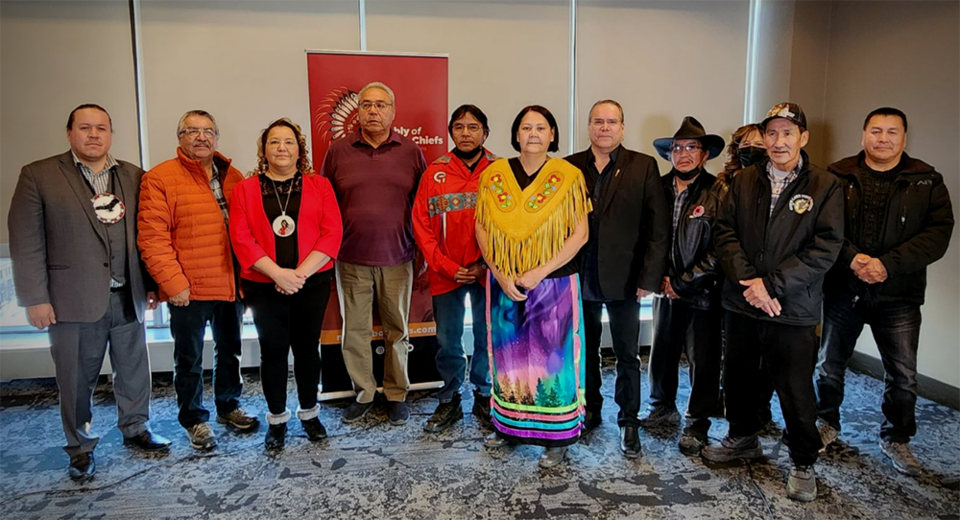A Northern Manitoba First Nation where as many as 30 per cent of members are struggling with addictions feels like its calls for immediate assistance are not being acted upon swiftly enough.
God’s Lake First Nation Chief Hubert Watt, who held a press conference in Winnipeg with other First Nations leaders on Nov. 14, said in a press release that the federal and provincial governments aren’t doing enough to help its 1,500 residents, 20 to 30 per cent of whom are currently experiencing drug addictions and are in a “crisis of epidemic proportions.”
“Our communities have many traumas that we are still healing from,” said Watt, identifying those traumas as root causes of the current crisis, which resulted in the First Nation declaring a state of emergency on Oct. 4. “We have called upon the federal governments for help over and over. They continue to ignore the lives being lost and the trauma being inflicted. We cannot stand by silently when out First Nation is in distress. We call on Indigenous Services Canada to help us. To provide the resources required to build treatment centres our community needs and hire the health care staff to help us heal.”
Walter Wastesicoot, grand chief of Keewatin Tribal council, which represents 11 Northern Manitoba First Nations, said that GLFN ha not received a response from the federal government for 42 days since declaring a state of emergency.
“That is unacceptable,” he said.
Jennifer Cooper, an ISC spokesperson, said the federal department is “deeply troubled” by the state of emergency and has been meeting regularly with leadership to talk about long-term and short-term supports for treatment and healing.
“Officials have been routinely meeting with representatives from God’s Lake First Nation and other communities in the region to work on a long-term plan,” Cooper said.
Among the existing supports are four rotating mental health therapists from the First Nations and Inuit Health Branch who provide 24/7 counselling support in GLFN. Cooper also said that Manitoba Keewatinowi Okimakanak’s crisis response team is en route to the community and that traditional healers remain available to provide assistance this week. Counsellors are also available by phone at 1-855-242-3310 or by online chat at hoepforwellness.ca.
Churchill-Keewatinook Aski NDP MP Niki Ashton, whose riding includes GLFN, said the community requires immediate action from the federal government.
“I have raised the need for action for GLFN directly with the minister,” she said. “And over the last number of weeks I have raised the need for the feds to work with KTC and others to address the mental health crisis that is only getting worse in remote communities across our region.”
GLFN is not the only remote northeastern Manitoba First Nation experiencing a crisis right now. Ashton spoke in the House of Commons last month about the plight of Red Sucker Lake First Nation, which declared a state of emergency in late October after a suicide and many other attempts.
“A 15-year-old in Red Sucker Lake First Nation took his life in his own schoolyard following another suicide and 17 attempts,” Ashton told the House Oct. 27. “It is time to fix their half-finished arena, deliver the new school they have been promised, build the regional treatment centre they need, and ensure people in poverty can afford basic necessities in the face of sky-high prices.”
Ashton told the Thompson Citizen Nov. 15 that while crisis supports are sometimes necessary, they can’t be the only government response to conditions on First Nations in her riding.
“As other communities have also made clear, there needs to be investment in key areas including broader health services, an end to the housing crisis, support for those struggling in poverty and an end to the isolation including the building of an all-weather road.”
Watt was supported by numerous other organizations and First Nation chiefs in Winnipeg on Nov. 15.
“Due to years of inadequate funding for accessible mental health supports, addiction treatment, primary care, education, housing and recreation, God’s Lake First Nation and its citizens are experiencing a humanitarian crisis,” said Assembly of Manitoba Chiefs Grand Chief Cathy Merrick. “The First Nation desperately needs immediate interventions from both provincial and federal levels of government to immediately provide life-saving supports such as crisis response teams, mental health professionals, and human resources for the nursing station.”
Assembly of First Nations Regional Grand Chief Cindy Woodhouse says the struggles of GLFN are common to many other First Nations in Manitoba and elsewhere and that the conditions that lead to such crises are longstanding and not being significantly improved despite years of promises.
“We have heard directly from First Nations’ leadership for years that the substance abuse crisis is something they have been dealing with for too long,” she said.
Inaction costs lives, said MKO Grand Chief Garrison Settee, both directly and indirectly.
“Our nations have lost enough, and they continue to pay for the government’s inaction. Due to inadequate public health, we will continue to see the detrimental effects of prolonged drug use, including late-stage diagnoses of life-threatening diseases. God’s Lake First Nation deserves better. Our First Nations people deserve better. It is imperative that God’s Lake First Nation receives the support they have repeatedly asked for.”




